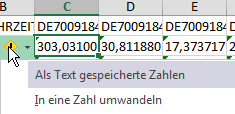Hello, i try to create dynamic Excel data i a german environment and have a problem with the datatype.

As you see fme detects the same value as utf-8 and 64 bit real. Real values generate correct output in excel as number but utf is put out as string with dot as decimal limitter.
Is there any way to force the datatype to real?
Hendrik







